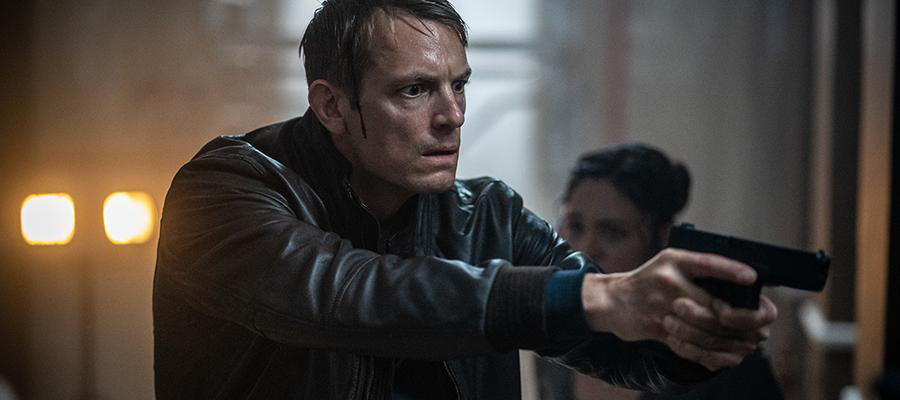Brad Anderson’s “The Silent Hour” adds a mild twist to a familiar genre tale and delivers a surprisingly efficient jolt of energy to the month in new releases. The new film, not to be confused with “Silent Night” a thriller that also stars Joel Kinnaman, opens with a brief series of sequences that follow Detective Frank Shaw (Kinnaman) on the job. After giving chase to a suspect, Shaw sustains an injury that damages his eardrums and leaves his sense of sound deteriorating. When we meet him a year later, he is struggling at home and at work. He has been confined to desk duty on the job and feels demotivated. His hearing aids provide only a temporary fix and his relationship with his daughter is struggling as he refuses to join her in accepting his disability.
This opening is primarily setting up plot-points to get to climax where an opportunity from his former partner Doug Slater (a dependable Mark Strong) offers Shaw a chance to meaningfully contribute to an investigation as an interpreter for a deaf murder-witness Ava (Sandra Mae Frank). When a chance encounter finds Frank as a witness to the potential abduction of their key-witness, “The Silent Hour” turns into a genre film hinged on disability. Frank and Ava must outwit a growing group of criminals and corrupt cops as they try to evade death.
It’s straightforward thriller stuff, except the opening and closing of the film is devoted to the idea of Frank Shaw and his acclimation to hearing loss as something thoughtful and contemplative.
And, importantly, Joel Kinnaman is playing it all with a tender conviction that adds a dignity to “The Silent Hour” that will prove essential as it quickly moves through its 100-minute running-time.
More than anything, “The Silent Hour” is an urgent reminder that Joel Kinnaman remains a reliable genre actor who continues to be undervalued as a leading man. His previous work as a detective, opposite Mirielle Enos in AMC’s “The Killing”, many years ago was a star-making turn that never came to be. Despite competent leading work, most notably in the underrated 2019 thriller “The Informer”, Kinnaman seems to still fly under the radar of his peers. It’s a shame because even in moderately familiar fare, he’s sharply attuned to his characters’ interiority, adding impressive waves of complexity to his use of his body.
He is the best thing in “The Silent Hour”, stoking at depths of empathy and complicated charm under his statuesque figure. He’s got excellent chemistry with Frank, as the in-over-her-head witness and Anderson is finding several moments of emotional tautness with his camera to supplement the straightforward cat-and-mouse game that the two find themselves in. Mekhi Phifer turns up as a corrupt cop, and the film’s primary antagonist, delivering his dependable mix of world-weary intensity.
When “The Silent Hour” veers into a contemplation on corruption within the police landscape, I found myself impressed by its willingness to thread real-world context into its plot, while keeping focused on the implications for the deaf at its crux. As the thrills keep climbing you can see shapes of other films in its wake, with a particular arc near the end that seems bound to “Wait Until Dark” and its approach at using disability as a weapon for its primary characters. Even as the stakes keep mounting, Kinnaman keeps turning “The Silent Hour” into a film about a specific man more than a generic thrill-ride. He retains a sharp ability to play stolid masculinity with hints of sensitivity beneath and as Frank works to retain his confidence, it’s an angle I wish “The Silent Hour” or any film could explore more. This isn’t as provocative work as Riz Ahmed’s journey of hearing loss in “The Sound of Metal” but I was impressed to leave “The Silent Hour” feeling like the film more than acquits itself when it comes to recent media on hearing loss and deafness.
I found myself thinking of the recent Netflix thriller “Rebel Ridge” through a lot of the film.
In two instances, its tale of police corruption and the use of drugs on a potential witness, I found myself more intrigued by the humbler trappings of “The Silent Hour” even as it is receiving very little fanfare from global audiences. It’s a shame. It manages to be leaner than the Netflix original, while retaining a melancholic ambivalence that feels earned and sincere. There’s a note of earnestness to its last few minutes that feel well-earned in their focus on the personal, that also suggest a film that’s intelligently recognising its interpersonal dynamics.
“The Silent Hour” is unlikely to make my list of best films of 2024, but I left it impressed by its quiet diligence. Despite never purporting to be a thorough social-issues character study it’s able to convey the key insight in disabilities on screen with sincere power that melded its message with enough thrills of the genre to engage.
It melds its sociocultural critique with genre trappings that end up seeming at home together. This is the type of throwback thrill-ride that cinemas would be better for. In a world of too many over-budget thrillers with little on their mind, there’s a warm charm to “The Silent Hour” and its modest thrills.
The Silent Hour is playing in cinemas


